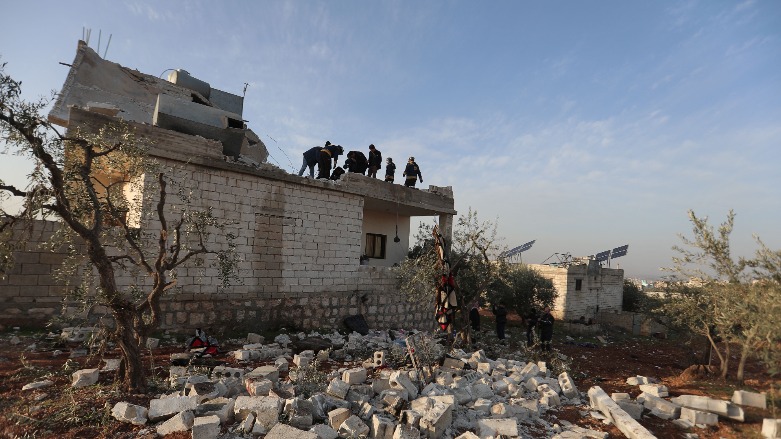Biden hails Kurdish forces in operation that killed ISIS leader, fight the terrorist group

WASHINGTON DC (Kurdistan 24) – On Thursday, US President Joe Biden announced the killing of the leader of ISIS in northwest Syria, in Idlib Province, the night before.
In the process, Biden hailed the Kurdish-led Syrian Democratic Forces (SDF), America’s main partner in the fight against the terrorist group in Syria, as well as the Kurdish Peshmerga, who are a key component of the partnership which the anti-ISIS coalition has with local forces in Iraq.
For his part, Masrour Barzani, Prime Minister of the Kurdistan Region, hailed “the removal of the terrorist Abu Ibrahim al-Qurayshi from a region he did so much to harm” affirming it “is welcomed by our people and our Yazidi brothers and sisters in particular.”
The removal of the terrorist Abu Ibrahim al-Qurayshi from a region he did so much to harm is welcomed by our people and our Yazidi brothers and sisters in particular.
— Masrour Barzani (@masrour_barzani) February 3, 2022
Qurayshi’s ruinous legacy of genocide and destruction has now ended. And ISIS has suffered another painful blow.
Biden explained that the US had chosen to target the terrorist leader in a Special Forces raid, rather than with an airstrike in order to minimize civilian casualties.
Reportedly, the Special Forces team took off from Erbil, flying by helicopter to their target in northwest Syria.
Qurayshi (or “Hajji Abdullah,” as Biden referred to him) had “chosen to surround himself with families, including children.” Resident in a three-story cinder block house, Qurayshi blew himself up as the Special Forces team approached, Biden explained, using such a large quantity of explosives that he destroyed the entire third story of the building. Those with him, including his wife and children, died with him.
Qurayshi Behind Attack on Hasakah Prison
Qurayshi is an Iraqi, who became leader of ISIS in 2019, when his predecessor, Ibrahim Awwad al-Samarrai, also known by his nom de guerre, Abu Bakr al-Baghdadi, was killed in a US strike, also in Idlib province.
Qurayshi, Biden explained, was behind ISIS’ Jan. 20 assault on Hasakah prison, which aimed to free prisoners held there. Backed by Coalition forces, the SDF succeeded in driving ISIS out of the prison and recapturing those who had fled.
But the fighting was intense, and the SDF suffered over 120 dead. Thus, Biden gratefully hailed “our brave partners in the Syrian Democratic Forces.”
Possibly, ISIS’ Jan. 20 assault on the prison provided new information that enabled the raid on Qurayshi, which US officials say was long-planned.
Syrian Responsibility?
The first response of local Kurdish commanders to the attack on the Hasakah prison was to blame the Syrian regime, as the attack followed shortly after a renewed effort by Damascus to advance its control over the area.
Siyamand Walat, commander of the Internal Security Forces (Asayish), was the most senior of local Kurdish forces to blame Syria for the prison assault.
Another such indication of Syrian involvement has emerged from the killing of Qurayshi.
Airwars.org monitors and assesses “civilian harm from airpower-dominated international military actions,” its website explains. Its focus is Iraq, Syria, Libya, Somalia and Yemen. Joe Dyke, formerly the AFP’s chief correspondent in the Palestinian territories, now works for “Airwars.”
On Thursday, Dyke tweeted an interview with the owner of the house in which Qurayshi was living. The owner said that the tenant was from Aleppo and had shown a Syrian identification card, when renting the house.
Praise for Peshmerga, as Biden confirms continued anti-ISIS Fight
International media reported that the Special Forces team had flown out of Erbil, indicating the important role that the Kurdistan Region plays as a secure base for anti-ISIS operations conducted by US forces and the anti-ISIS Coalition more broadly.
On Thursday, in describing the military operation that killed Qurayshi, Biden affirmed, “We’ll continue working with our close allies and partners, the Syrian Democratic Forces, the Iraqi Security Forces, including the Kurdish Peshmerga, and more than 80 members of the Global Coalition to keep pressure on ISIS.”
Read More: Biden administration: We have a ‘strategic partnership’ with the Kurdistan Region
The Biden administration has long described its relationship with the Kurdistan Region as a “strategic partnership,” and Biden’s reference to the Peshmerga in expressing his appreciation for those forces fighting ISIS is consistent with that approach.
